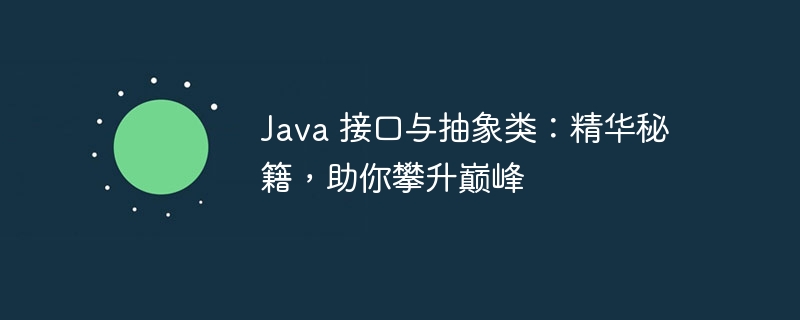Home >Java >javaTutorial >Java Interfaces and Abstract Classes: Essential Secrets to Help You Climb to the Top
Java Interfaces and Abstract Classes: Essential Secrets to Help You Climb to the Top
- WBOYWBOYWBOYWBOYWBOYWBOYWBOYWBOYWBOYWBOYWBOYWBOYWBforward
- 2024-03-27 17:26:201100browse

php editor Youzi has brought you the essence of Java interfaces and abstract classes to help you reach the top of your programming journey. Mastering these two important concepts is crucial for Java programmers. Interfaces and abstract classes play an irreplaceable role in object-oriented programming. A thorough understanding of their principles and applications will help you write more efficient and robust code and improve your programming level. Let us explore these knowledge points together and continuously improve our skills in the field of Java programming!
- Concept: The interface defines a set of abstract methods and specifies the method signatures that the class must implement.
-
Features:
- Contains only abstract methods, no concrete implementation.
- Declared as
interfacekeyword. - Multiple interfaces can be extended.
-
effect:
- Promotes decoupling, allowing implementation to be checked at compile time.
- Force subclasses to implement specified methods.
- As a contract, ensuring that the implementation has the expected behavior.
Abstract class
- Concept: An abstract class defines a contract that specifies the methods that subclasses must implement.
-
Features:
- Can contain abstract methods and concrete methods.
- Declared as
abstractkeyword. - Only one abstract class can be inherited.
-
effect:
- Provide partial implementation, allowing subclasses to implement only specific behaviors.
- Force subclasses to inherit specific functionality.
- Reduce code duplication and promote code reuse.
Choose interface or abstract class
The choice of interface or abstract class depends on specific needs:
-
Using interface:
- When you need to force a class to implement a specific method signature.
- When you need to decouple classes.
- When multiple contracts need to be expanded.
-
Use abstract class:
- When partial implementation needs to be provided.
- When you need to force subclasses to inherit specific functions.
- When you need to reduce code duplication.
Compare
| feature | interface | Abstract class |
|---|---|---|
| Method signature | Abstract method | Abstract methods and concrete methods |
| statement | interface |
abstract |
| Multiple inheritance | Support, multiple interfaces can be extended | Not supported, only one abstract class can be inherited |
| accomplish | Force implementation of all abstract methods | You can only implement some abstract methods |
| Implementation | No | Can contain specific implementation |
Example
interface:
public interface Shape {
double getArea();
}
Abstract class:
public abstract class Animal {
protected String name;
public abstract void makeSound();
}
The actual significance of the difference
- Interface forces subclasses to implement all methods to ensure consistency.
- Abstract classes allow subclasses to choose which methods to implement, providing greater flexibility.
Best Practices
- Use interfaces first: Unless it is necessary to provide partial implementation, give priority to using interfaces for decoupling and enforcing contracts.
- Keep abstract classes simple: Abstract classes should only contain core functionality that is shared with subclasses.
- Avoid too many abstract methods: Too many abstract methods will make the interface or abstract class difficult to implement.
- Use documentation: Clearly record the purpose of interfaces and abstract classes to avoid confusion.
The above is the detailed content of Java Interfaces and Abstract Classes: Essential Secrets to Help You Climb to the Top. For more information, please follow other related articles on the PHP Chinese website!

